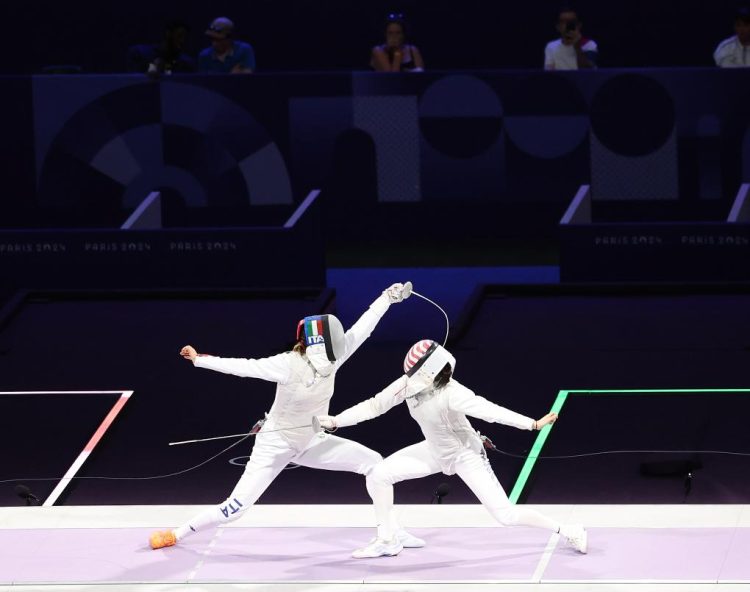Introduction
The Fencing World Championships are one of the most prestigious events in the sport, where the world’s best fencers gather to compete for glory. Every year, fans and experts alike look forward to thrilling matches, and French fencers are often among the favorites to win, thanks to their rich history in the sport. However, at recent World Championships, many were left wondering why a French fencer, who had been performing superbly throughout the competition, faltered in the final and failed to secure the gold medal.
In this article, we will explore the possible reasons why the French fencer did not perform to their best ability in the World Championship final. From psychological pressures and physical fatigue to tactical errors and the opponent’s strengths, we will examine the key factors that could have contributed to the underperformance in such a high-stakes match.
I. The Pressure of the Final: Psychological Factors at Play
In any sport, the pressure of performing in the final can be immense, and fencing is no exception. The mental aspect of the game plays a significant role in how athletes perform under high-pressure situations. The psychological toll of knowing that one match will determine whether they win or lose the most coveted prize can be overwhelming for even the most experienced fencers.
A. The Weight of Expectations
French fencers have historically been expected to perform at the highest level, given the country’s longstanding tradition of excellence in the sport. This expectation can create added pressure, especially for younger or less experienced athletes who may struggle to manage the mental aspects of competition.
- National Pride and Legacy: France has a proud fencing history, and the expectation to continue that legacy can sometimes weigh heavily on a fencer’s mind, distracting them from focusing entirely on the match itself.
- Fear of Failure: The fear of letting down their coaches, teammates, and the entire nation can lead to anxiety, making it difficult for athletes to execute their skills effectively.
B. Nerves and Performance Anxiety
In high-stakes finals, nerves can take a toll on any athlete’s performance. For fencers, the need for precision, quick reactions, and confidence in their technique makes mental stability essential. A fencer who becomes overwhelmed by nerves might struggle with basic skills such as timing, distance management, and decision-making.
- Loss of Focus: Performance anxiety can lead to a loss of concentration, affecting the fencer’s ability to execute attacks and defenses efficiently.
- Rushing or Overthinking: Nervousness can cause athletes to either rush their actions, leading to mistakes, or overthink every move, which can disrupt their natural flow of fencing.
II. Fatigue and Physical Factors
Fencing is a physically demanding sport, requiring quick bursts of energy, sharp reflexes, and a high level of endurance. Athletes must maintain peak physical condition throughout the tournament, but the cumulative effects of a grueling competition schedule can lead to fatigue. This can particularly affect fencers in the final round, where both physical and mental resilience are tested to the fullest.
A. The Toll of a Long Tournament
The World Championships typically consist of multiple rounds, including qualification stages, pool play, and elimination matches. By the time the final arrives, even the fittest athletes may be feeling the physical effects of several days of intense competition.
- Muscle Fatigue: The repetitive nature of fencing movements, combined with the intense mental focus required, can result in muscle fatigue and reduced physical output.
- Endurance Strain: Fencers must endure long hours of competition, often with limited recovery time between matches. By the time the final arrives, a fencer’s physical resources may be depleted.
B. Recovery Issues
Recovery is a crucial aspect of any sport, and in high-level fencing, quick and effective recovery can be the difference between winning and losing. If a fencer has not been able to fully recover from earlier matches, their physical performance may be compromised during the final.
- Insufficient Rest: If the fencer has not had enough time to recover, they might lack the necessary energy and focus to perform at their peak in the final.
- Dehydration and Nutrition: Proper nutrition and hydration are key factors in maintaining physical performance. Any lapses in this area can lead to decreased energy levels and impaired decision-making.
III. Tactical Errors and Strategic Mistakes
While mental and physical factors play a crucial role, sometimes the most obvious reason for underperformance in a final comes down to mistakes in strategy and execution. Fencing is a sport of tactics, with each fencer needing to carefully manage timing, distance, and decision-making. A fencer who fails to adapt to their opponent’s style or who becomes too predictable can easily lose momentum during a final.
A. Misreading the Opponent’s Strategy
Every fencer has a unique style, and understanding the opponent’s tactics is key to winning. If a French fencer was unable to effectively read their opponent’s strategy, they could have been outmaneuvered during crucial moments of the match.
- Predictability: If a fencer becomes too predictable in their attacks or defenses, the opponent can anticipate their movements and counter them effectively.
- Failure to Adapt: Fencers who are unable to adapt to changing situations or make quick tactical adjustments can find themselves in difficult positions, especially in high-pressure finals.
B. Over-Commitment to Offensive Play
Another common tactical error in fencing is an over-reliance on aggressive offense. While attacking is a crucial part of the sport, overcommitting to attacking moves without maintaining a balanced defensive posture can open up opportunities for the opponent.
- Too Aggressive: In fencing, attacking too aggressively or too frequently without considering defense can leave a fencer vulnerable to counter-attacks.
- Lack of Patience: Sometimes, the best approach is to wait for the opponent to make a mistake or leave an opening, rather than forcing an attack. A fencer who does not maintain patience might rush their actions, leading to mistakes.

IV. The Opponent’s Strengths and Strategy
Fencing is often a battle of styles and strategies. The opponent’s skills, experience, and tactics can have a significant impact on the outcome of the final. If the French fencer was facing a highly skilled and well-prepared opponent, this could have played a significant role in the final result.
A. Superior Technique or Tactics by the Opponent
If the opponent was particularly strong in a certain area, such as defense or counter-attacking, it could have made it difficult for the French fencer to execute their usual game plan.
- Counter-Attacking Skill: A fencer who excels in counter-attacking can make it difficult for their opponent to land successful attacks, especially if they are under pressure in the final.
- Superior Mental Toughness: Some athletes thrive under pressure, and if the French fencer’s opponent was able to maintain composure in the final, it could have given them the edge during crucial moments.
B. Previous Match Analysis
The opponent may have studied the French fencer’s previous matches and identified weaknesses or patterns in their play, using this knowledge to craft a strategy that neutralized the French fencer’s strengths.
- Adaptation to the French Style: A well-prepared opponent may have been able to anticipate and counter the French fencer’s moves, making it difficult for them to execute their usual tactics.
- Exploiting Weaknesses: Every fencer has weaknesses in their game. If the opponent successfully exploited these weaknesses during the final, it could have contributed to the French fencer’s underperformance.
V. Conclusion
The reasons behind a French fencer’s underperformance in a World Championship final are multifaceted, ranging from psychological pressures and physical fatigue to tactical errors and the strength of their opponent. Fencing, as a sport that demands both mental and physical precision, requires athletes to manage a delicate balance of focus, endurance, and strategic thinking.
While the French fencer may not have been able to perform at their best in the final, this should not diminish their achievements leading up to the event. Fencing is a highly competitive and unpredictable sport, and even the best fencers can experience moments of weakness or misfortune. Moving forward, they will have the opportunity to analyze their performance, learn from the experience, and come back stronger in future competitions.
Ultimately, the French fencing community remains a powerhouse in the sport, and this setback in the final will only serve as motivation for future success.






























Discussion about this post